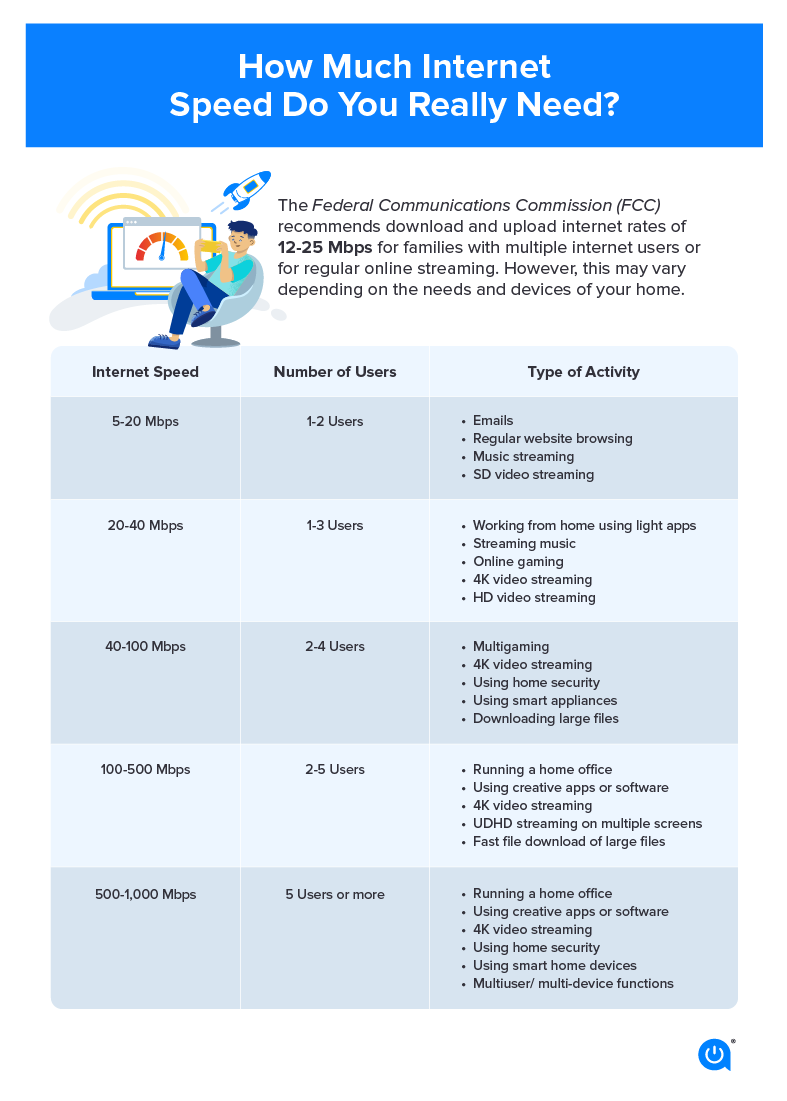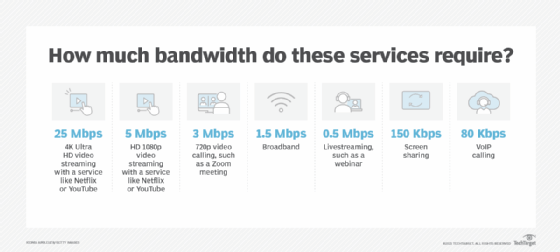Comparing Internet Suppliers: Who Supplies the very best Megabits Per Second?
Comparing Internet Suppliers: Who Supplies the very best Megabits Per Second?
Blog Article
Exactly How Megabits Per Second Influence Your Online Activities
The idea of megabits per second (Mbps) plays an essential duty in shaping our online experiences. Higher Mbps can enhance efficiency and decrease disruptions, while insufficient rates might cultivate aggravation and inefficiency.
Comprehending Megabits Per Second
When taking into consideration net rate, it's vital to comprehend the concept of megabits per second (Mbps), which functions as a basic measurement for data transfer prices. This metric evaluates just how much data can be transferred over a web connection in one second, giving a clear understanding of performance capabilities - Megabits Per Second. For context, one megabit amounts to one million little bits, and Mbps is commonly utilized to express transmission capacity for various online tasks
A higher Mbps indicates a much faster internet link, enabling users to execute tasks such as downloading data, surfing sites, and engaging in on the internet pc gaming more successfully. For example, common surfing needs around 1-5 Mbps, while streaming high-def video may demand 5-25 Mbps. Recognizing these needs is essential for figuring out the ideal net rate required for specific activities.
Additionally, the number of devices connected to a network can impact total efficiency. Numerous customers streaming, pc gaming, or downloading and install all at once can strain available bandwidth, leading to slower rates - Megabits Per Second. Assessing personal online behaviors and needs is vital in picking a net strategy that lines up with one's requirements, guaranteeing a seamless electronic experience
Streaming and Buffering Issues
Streaming high-def material has become a staple of modern on-line amusement, yet it is usually come with by irritating buffering issues. These interruptions can dramatically take away from the checking out experience, resulting in dissatisfaction and possible loss of audience engagement. Buffering takes place when the data transmitted from the streaming solution is not received promptly sufficient to maintain a smooth playback, usually because of insufficient net speed gauged in megabits per second (Mbps)

Furthermore, real-time streaming can be affected by network blockage, which happens when multiple tools share the very same data transfer. Consequently, maximizing link speed and ensuring appropriate Mbps is vital for a seamless streaming experience. As streaming services remain to progress, understanding the influence of Mbps on buffering problems continues to be important for consumers looking for continuous entertainment.
Online Pc Gaming Efficiency
The effect of web speed on online tasks prolongs past streaming, substantially influencing on-line gaming efficiency. In competitive video gaming, reduced latency and high data transfer are crucial for a seamless experience. A rapid connection lessens lag, allowing players to respond swiftly to in-game events, which can be the distinction between success and loss.
Bandwidth, determined in megabits per second (Mbps), plays a vital function in sustaining multiple devices and video gaming systems at the same time. Not enough bandwidth can result in went down links or reduced game high quality, adversely affecting gameplay. Online multiplayer games need considerable information transfer, specifically throughout peak gaming hours when numerous players are online.
Busy first-person shooters demand higher speeds to maintain responsiveness, while turn-based technique games may function reasonably well on reduced rates. As on the internet gaming proceeds to progress, with enhancing visual integrity and more intricate multiplayer atmospheres, the demand for greater Mbps will only intensify.
Video Clip Conferencing High Quality
In today's digital landscape, video clip conferencing quality is greatly influenced by internet rate, particularly in the original source regards to bandwidth and latency. High-quality video clip calls require enough bandwidth to send audio and video clip data seamlessly. Commonly, a minimum of 1.5 Mbps upload and download speeds is advised for conventional interpretation video, while high-def video conferencing normally demands at the very least 3 Mbps.
Latency, or the hold-up in between sending and receiving data, additionally plays a critical function in the individual experience. Greater latency can lead to resemble, lag, and disjointed communications, which can hinder partnership and interaction throughout conferences.
Moreover, multiple participants in a video seminar can stress offered transmission capacity, demanding even higher speeds. Network congestion, frequently triggered by synchronised tasks like streaming or downloading, can additionally weaken video clip top quality. Hence, for companies depending on video clip conferencing for remote cooperation, understanding the relationship between megabits per total and second interaction high quality is necessary for keeping productivity and see improving online interactions.
Choosing the Right Internet Plan
Choosing an appropriate internet plan is important for making sure optimum performance in different on the internet activities, especially in settings that explanation require high transmission capacity, such as video clip conferencing and online video gaming. Megabits Per Second. When thinking about an internet strategy, it is important to review both the rate and data allocation to match your details usage needs
For households with numerous individuals participating in synchronised tasks, a plan supplying greater megabits per second (Mbps) is advised. Commonly, a minimum of 25 Mbps is appropriate for conventional streaming and browsing, while strategies exceeding 100 Mbps are preferable for even more intensive jobs. Furthermore, consider the nature of your online tasks; video clip conferencing requires at the very least 1.5 Mbps submit rate, while on the internet gaming might need a reduced latency however consistent link.
It is likewise vital to analyze your data cap. Limitless information plans can prevent strangling and disturbances, particularly if heavy use is expected. Research study solution companies in your location, as availability and rates can differ. By thoughtfully picking an internet plan customized to your requirements, you can improve your on-line experience, making sure smooth, uninterrupted accessibility to your preferred activities.
Final Thought
Finally, the relevance of megabits per second (Mbps) in shaping on the internet activities can not be overemphasized. Higher Mbps promotes smooth streaming, lowers buffering, boosts pc gaming experiences, and makes certain high-quality video conferencing. Conversely, poor transmission capacity can bring about irritating disturbances and reduced efficiency across various jobs. A detailed understanding of private or home Mbps requirements is crucial for choosing a suitable net strategy that properly sustains diverse online tasks and individual demands.

Usually, a minimum of 25 Mbps is suitable for standard streaming and surfing, while strategies surpassing 100 Mbps are more suitable for even more extensive tasks. Additionally, take into consideration the nature of your online tasks; video conferencing calls for at the very least 1.5 Mbps submit speed, while on-line video gaming may require a lower latency yet constant connection.
Report this page